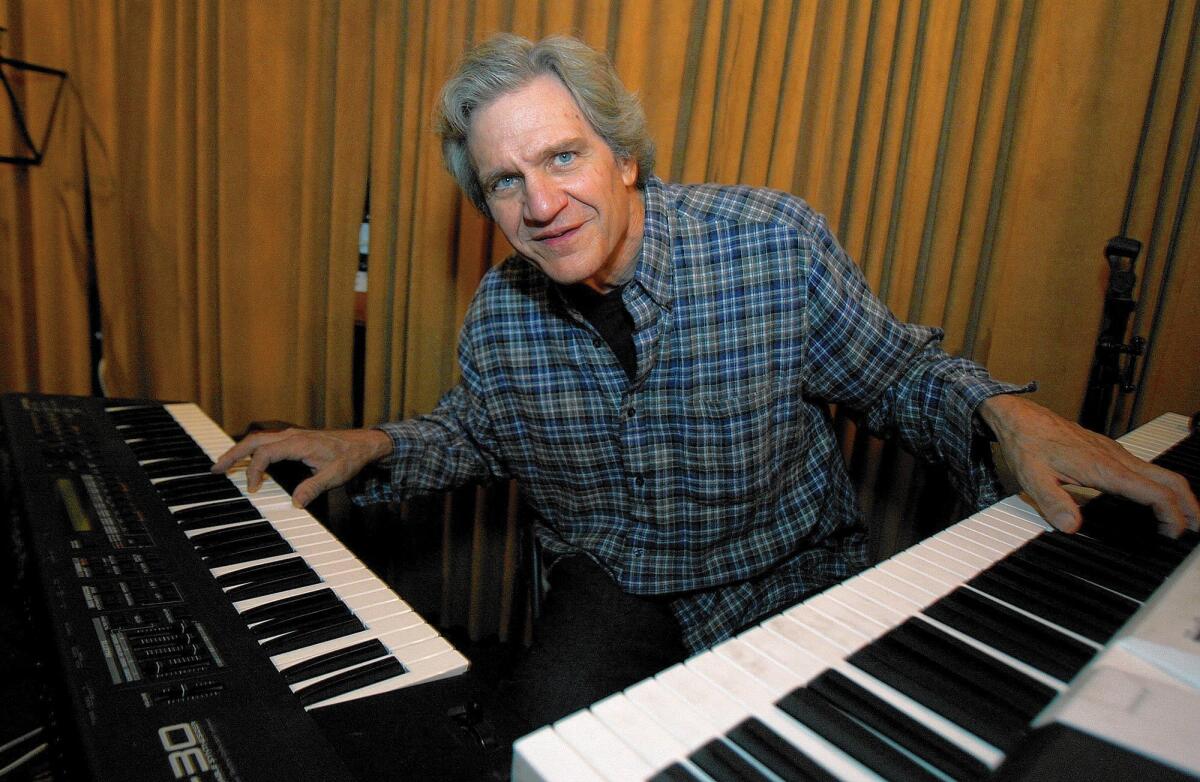Music Review: Livingston’s steel guitar skills born out of classical piano, passion for Bach

Douglas Livingston, best known for his prowess on the pedal steel guitar, is a multifaceted musician and appears with the Michael Hastings Band at Viva Cantina in Burbank on Dec. 19.
- Share via
Musician Douglas Livingston, trained as a classical pianist and obsessed with the music of Johann Sebastian Bach since childhood, nonetheless defected into a distinguished pop music career. A combination of propinquity and coincidence thrust him into alliances with the likes of Neil Diamond, George Strait, Bette Midler, Babyface, Randy Newman and Olivia Newton John. He also served as bandleader for, and recorded with, Jose Feliciano and Donna Summer — at the flaming height of her late ‘70s disco renown.
Livingston, who appears Saturday, Dec. 19, at Viva Cantina as part of former Burbank Mayor Michael Hastings’ band, is universally regarded as one of the very finest pedal steel guitar players alive today. His approach to that instrument is a relaxed, evocative one, full of wide-open spaces between notes, with a rich, lush tone that’s fraught with color, emotion and atmosphere.
“I got interested in steel guitar after I saw a guy playing one in a lounge in Las Vegas in the early ‘70s,” Livingston said. “I’d never seen one, didn’t know anything about it. So I bought one and it kind of took over my life.”
Born Feb. 20, 1947 in Lafayette, Indiana, he exhibited a natural musicality at the earliest age.
“My parents said I always seemed interested in music. I would sing along with records before I could talk, and was always drawn to pianos whenever I saw one, and started taking lessons,” he said. “Every kid studying piano plays Bach, some of it was easy, some of it was not. Bach is universal, I still love it and I play it every day.”
There were no rock bands at his high school. “In the 1950s in Indiana, kids would talk about Elvis, but I didn’t really ever hear it,” Livingston said. “When I went to college I learned that the local radio stations had been ‘protecting’ us from black music, I didn’t know who Little Richard was — that was absolutely out of the question back home. So, of course, I got an electric guitar and was out there playing ‘Louie Louie.’”
“When I was in graduate school some of the local rock bands were making money. They had very creative management. One of them persuaded me to quit school and join the band. I was ready for a change, but two months later they fired me. That was a good education in what the music business was really like.”
Livingston arrived in Los Angeles in 1972, where a visit to a San Fernando Valley jazz club altered his navigation.
“I went out to the Baked Potato and heard Larry Carlton playing in a little band. I thought, ‘Wow, these guys are really pretty good,’ and realized I wasn’t going to make it on guitar, so I switched back to piano. Jose Feliciano was my first road job, in 1974. I went down to his place in Orange for an audition. He didn’t say much, just started playing guitar and I followed him, on the piano. He said, ‘Hey, that sounds good. Be at the airport on Friday, we’re going to Mexico.’”
The blind, brilliant self-taught guitar virtuoso immediately provided Livingston an even broader musical education.
“We never rehearsed, not once.” Livingston said. “Every night it would be stuff we’d never played. He had a couple of hits that he’d play regularly, but other than that it was always something new. And when we got to the Latin American countries, he was really playing stuff we’d never heard before. But I enjoyed that very much. Something fresh for the ear, you never knew what was coming next.”
He quickly mastered the steel and found even greater opportunities: “That was when I started doing a lot of session work, TV shows and movies. For those jobs, you had to be able to read and while there were a lot of wonderful steel players out here, none of them could read, so I had a tremendous advantage.”
His career continued to thrive. “I played piano for Donna Summer for a long time, started in 1977 and kept it up until 1982,” Livingston said. “That was a touring job. We’d be out for one-third of the year. Singers don’t like to be surprised, and when you play with someone who is well known, you’re doing the same thing over and over, every night. It was a job, I got to travel around the world, meet people, see people doing things they probably shouldn’t be doing. But really it was not that interesting. When you see it up close, it’s a disorganized mess and you wonder how the concerts ever happen.”
Livingston got off the road and settled into steady session work and frequent club dates. To break the monotony, he also took up a fascinating practice: interpreting Bach on his Sho-Bud pedal steel guitar.
“Bach wrote music that is pretty much too complex for a steel guitar soloist. But he also wrote six suites for unaccompanied violin and another six for unaccompanied cello, and those you can play really well on the steel — it’s playable because he wrote them for a four-string instrument. And I think it sounds absolutely gorgeous on the steel.”
“So I’m doing that every day. I can’t get away from it. I have to do it.”
--
Who: Douglas Livingston, with the Michael Hastings Band
Where: Viva Cantina, 900 W. Riverside Dr., Burbank
When: Saturday, Dec. 19, 8 p.m.
Cost: Free
More info: (818) 845-2425, vivacantina.com
--
JONNY WHITESIDE is a veteran music journalist based in Burbank and author of “Ramblin’ Rose: the Life & Career of Rose Maddox” and “Cry: the Johnnie Ray Story.”